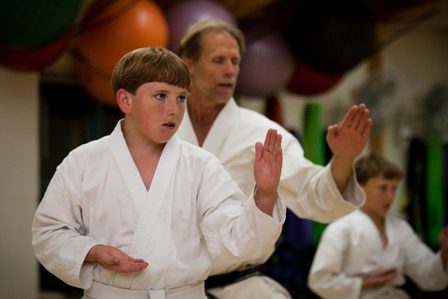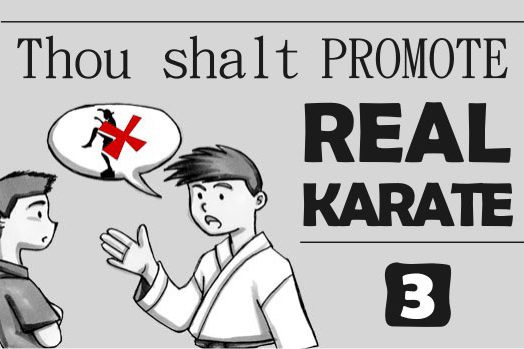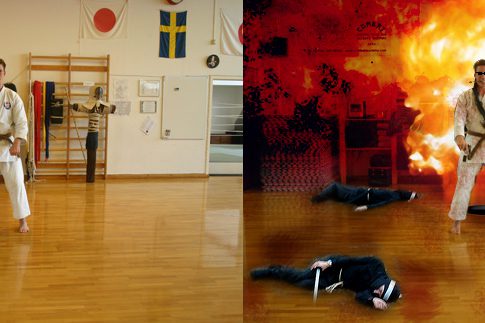Fun fact:
At the tender age of twenty-three, French mathematician, physicist, inventor, writer and Catholic philosopher Blaise Pascal claimed to have empirical evidence that the void exists. As the story goes, when René Descartes, notorious denier of “the void”, heard about this he wrote a bold letter stating that the only void that exists is inside the head of Pascal.
Ouch.
As you see, the philosophical controversy over the concept of “emptiness”, the “void”, or “nothingness” is not a new phenomenon – clearly, the old Frenchies loved arguing about it.
So how about Karate?
What is “emptiness”, “the void” or “nothingness”? What should we know about it, and how does it relate to Karate?
(Hey, don’t look at me! Sure, I’m known to say that “the hole” is the best part of the donut, but that’s just a joke!)
All I know is that in Karate, or Budo in general, this concept of emptiness is applied in something known as “mushin” (actually, this term is shortened from mushin no shin, a Zen expression meaning “mind without mind”) and that venerated Karate masters such as Funakoshi and Mabuni often wrote poems pondering the inherent mysticism associated with the void.
“When the spirit of Karate-Do (Bu) is deeply embraced
It becomes the vehicle (described as a boat) in which one is ferried
Across the great void to the ‘world within’ (described as ‘Bu’-island)”– Mabuni Kenwa (1889 – 1952)
“As a mirror’s polished surface reflects whatever stands before it and a quiet valley carries even small sounds, so must the student of Karate-Do render of their mind empty of selfishness and wickedness in an effort to react appropriately toward anything they might encounter. This is the meaning of kara or “empty” of Karate-Do.”
– Funakoshi Gichin (1868-1957)
Mushin.
“Empty mind.”
The term in itself, when you think about it, is quite interesting. I mean, if you try to think of “nothing” you will sooner or later inevitably think of something concrete, like a black or white surface. It’s difficult. Because clearly, if something does not exist it’s impossible to think about it. That’s why people have a hard time understanding the void. Which, in turn, is why we call it different stuff: “the void”, “emptiness”, “nothingness” or the number “zero”. Why? Because labels help us grasp this weird concept, and then proceed to think about it.
But, of course, there’s a paradox here:
- Labels, names and words are limited.
- …but the void is unlimited.
Putting a name on nothingness is to limit its existence.
So let’s try to dive a bit deeper into the void then.
In this internet-driven world of constant online connection, it is safe to say that our lives are cluttered by noise (of all kind). No question about it. And sure, while the general noise of life can be beautiful, relaxing and certainly inspiring, like the ballads of song or the sound of happiness embodied in laughter, there is also this constant, harmful, noise that eventually becomes the status quo of how we live our lives.
eventually becomes the status quo of how we live our lives.
You probably recognize this phenomenon in those moments devoid of audible commotion, as they might suddenly turn into awkward instances of discomfort instead – and that’s when we know we have become addicted to surrounding ourselves with background noise, losing the uniqueness of moments of quiet that provide us with the exceptional clarity, inner balance and present-mindedness which we all crave.
Just the type of mindstate you would want to have in Karate.
Mushin.
When constantly surrounded by the noise of everyday life – from the sound of the alarm in the morning, to the car radio, our iPods and MP3 players, music on our computers, to TVs and so much more – the constant stream of noise and sounds becomes the natural state of life. Almost every waking moment is consumed or accompanied by noise. Thus, strangely enough, the peaceful pace of nature (called “silence”) often and quickly becomes a discomfort for people (most joggers can’t even run in the woods without loud music in their ears – that’s messed up!)
I mean, is it just me, or have we lost something essential to ourselves when moments of quietness are considered socially awkward, even when interacting with friends, family members and/or acquaintances?
Sometimes it seems we have become so entrenched in noise that we forget what it is like to live, work, even sleep or simply exist in the midst of silence.
And this is unfortunate.
Because during moments of silence and nothingness, a purer side of ourselves reemerges.

I truly believe that if we actively try to seek out those few precious moments of emptiness, or nothingness, then our “soul” somehow floats up from the dephts of the clutter and brings us back to our original nature – if only for a moment. That’s when, often without so much as realizing it, we embrace the present moment for all of its worth and abandon the common chaos and noise of everyday life. Then, devoid of the noise of life and “thinking for the sake of thinking,” in this void we somehow regain the peace of mind of living in the moment – the unfamiliarity of living consciously and fully in the present time.
Also known as mushin.
The power that comes from moments of silence and quiet – those times in nature or alone to ourselves when our minds become blank and free – is unimaginable for most people, as they probably don’t even remember the last time they arrived at a state of mind that allowed them to fully exist in the moment. Those rare moments of silence when we abandon the confines of our thoughts; the constant stream of consciousness and thinking that begins when we wake and pauses when we sleep.
Devoid of the clutter of noise, we are nothing more or less than in existence; we are because we are and the universe is because it is.
So embrace mushin, and try to lose yourself for once.
If only for a moment.
“See how nature – trees, flowers, grass – grows in silence; see the stars, the moon and the sun, how they move in silence.
We need silence to be able to touch souls.”
– Mother Teresa



11 Comments